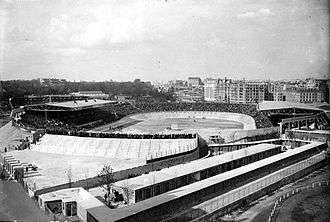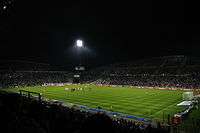1954 Rugby League World Cup
The 1954 Rugby League World Cup was rugby league football's first World Cup and was held in France in October–November 1954.[1] Officially known as the "Rugby World Cup",[2] four nations competed in the tournament: Australia, France, Great Britain and New Zealand. A group stage was held first, with Great Britain topping the table as a result of points difference. They went on to defeat France (who finished second in the table, level on points) in the final, which was held at Paris' Parc des Princes before approximately 31,000 spectators.[3]
| 1954 World Cup | |
|---|---|
| Number of teams | 4 |
| Host country | |
| Winner | |
| Matches played | 7 |
| Attendance | 138,329 (19,761 per match) |
| Points scored | 231 (33 per match) |
| Top scorer | |
| Top try scorer | |
The prime instigators behind the idea of holding a rugby league world cup were the French, who were short of money following the seizing of their assets by French rugby union in the Second World War. The first rugby league world cup was an unqualified success. It was played in a uniformly good spirit, provided an excellent standard of play and was a fitting celebration of France's 20th anniversary as a rugby league-playing nation. The trophy, which was donated by the French, was worth eight million francs.[4]
Background

The World Cup was a French initiative. Led by Paul Barrière, who donated the Rugby League World Cup trophy himself,[5] they had been campaigning for such a tournament since before the Second World War. Teams from Australia, Great Britain, New Zealand and the United States were invited to join the hosts, France, for the first World Cup in 1953.[6] However, the tournament was not held until 1954, with all teams except the United States participating. The French had suggested that the United States play but the other nations were concerned about a lack of competitiveness which was borne out by France beating the United States 31–0 on 9 January 1954.[7] It had been suggested that Wales be invited instead of the USA but they weren't approached.[8]
The uncertainty of the ultimate outcome was of particular interest. In the early 1950s all four competing nations were quite capable of beating each other – no test series in the period was a foregone conclusion.
If there were a favourite it was Australia who had just won back the Ashes. However, in 1953 they had lost series to both the French and the Kiwis, while Great Britain had defeated New Zealand on the second half of their 1954 Australasian tour.
The form book merely provided a conundrum which was made more confusing when the British were forced, through injuries and players making themselves unavailable, to select a raw and largely untried squad which was given little credibility by the cynics.
The captains for this historic event were Puig-Aubert (France), Cyril Eastlake (New Zealand), Clive Churchill (Australia) and Dave Valentine (Britain). The referees were Warrington's Charlie Appleton and Rene Guidicelli (Perpignan).
Teams
| Team | Nickname | Coach | Captain |
|---|---|---|---|
| The Kangaroos | Vic Hey | Clive Churchill | |
| The Kiwis | Jim Amos | Cyril Eastlake | |
| The Lions | G. Shaw | Dave Valentine | |
| Les Chanticleers | Puig Aubert |
Venues
The games were played at various venues in France with the Final played at the Parc des Princes in Paris.
| Paris | Marseille | Toulouse |
|---|---|---|
| Parc des Princes | Stade Vélodrome | Stadium de Toulouse |
| Capacity: 48,712 | Capacity: 49,000 | Capacity: 37,000 |
 |
 |
|
| Lyon | Bordeaux | Nantes |
| Stade de Gerland | Stade Chaban Delmas | Stade Marcel Saupin |
| Capacity: 30,000 | Capacity: 30,000 | Capacity: 20,000 |
 |
 |
Results
Group stage
| Team | Pld | W | D | L | PF | PA | Diff | Pts | Qualification |
|---|---|---|---|---|---|---|---|---|---|
| 3 | 2 | 1 | 0 | 67 | 32 | +35 | 5 | Advances to the Final | |
| 3 | 2 | 1 | 0 | 50 | 31 | +19 | 5 | ||
| 3 | 1 | 0 | 2 | 52 | 58 | −6 | 2 | ||
| 3 | 0 | 0 | 3 | 34 | 82 | −48 | 0 |
| 30 October 1954 | France | 22 – 13 | Parc des Princes, Paris |
| 31 October 1954 | Australia | 13 – 28 | Stade de Gerland, Lyon |
| 7 November 1954 | France | 13 – 13 | Stadium de Toulouse, Toulouse |
| 7 November 1954 | Australia | 34 – 15 | Stade Vélodrome, Marseille |
| 11 November 1954 | Great Britain | 26 – 6 | Stade Chaban Delmas, Bordeaux |
| 11 November 1954 | France | 15 – 5 | Stade Marcel Saupin, Nantes |
Final
13 November 1954 |
| France |
12–16 | |
|---|---|---|
| Try: Raymond Contrastin Vincent Cantoni Goals: Puig Aubert (3) |
[9] | Try: Gerry Helme (2) Gordon Brown (2) David Rose Goals: Jimmy Ledgard (2) |
France
|
Great Britain
|
|
| ||||||||||||||||||||||||||||||||||||||||||||||||||||||||||||||||||||||||||||||||||||||||||||||||
Try scorers
- 6
- 5
- 4
- 3
- 2
- 1
References
In-line
- 1954 World Cup Archived 13 July 2009 at the Wayback Machine at rugbyleagueplanet.com
- SPARC, 2009: 28
- 1954 World Cup at rugbyleagueproject.org
- RLIF. "Past Winners: 1954". Rugby League International Federation. Archived from the original on 12 October 2008. Retrieved 25 October 2008.
- "1954 World Cup". 188 Rugby League. Archived from the original on 26 February 2012. at 188-rugby-league.co.uk
- AAP (19 January 1953). "World Cup Suggestion". The Sydney Morning Herald. Australia. p. 7. Retrieved 25 December 2009.
- "France vs. United States of America". Rugby League Project. Retrieved 13 October 2018.
- Ferguson, Andrew. "THE FRENCH BARRIERE THAT WOULDN'T BREAK" (PDF). MenofLeague. Retrieved 13 October 2018.
- Report
General
- Independent Review Committee (February 2009). "Rugby League – Contributing to New Zealand's Future" (PDF). New Zealand: SPARC. Archived from the original (PDF) on 22 May 2010. Retrieved 13 December 2009.